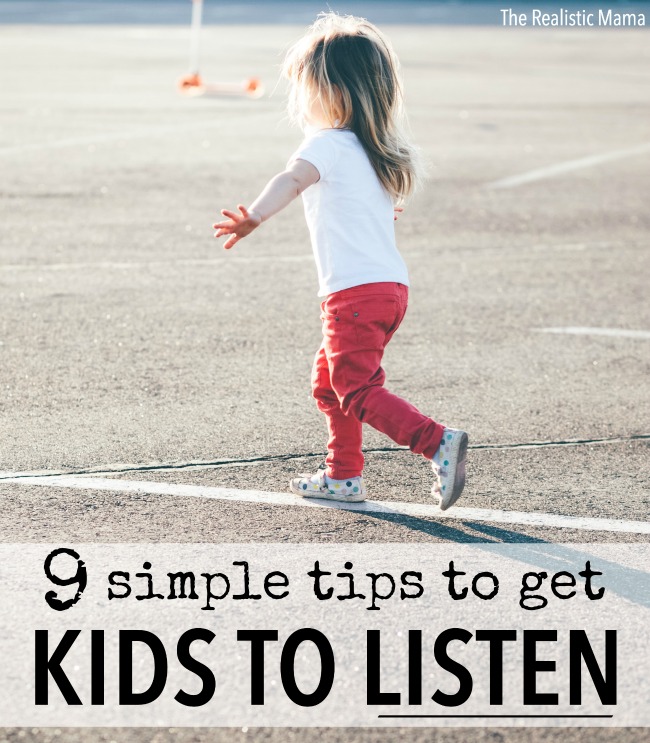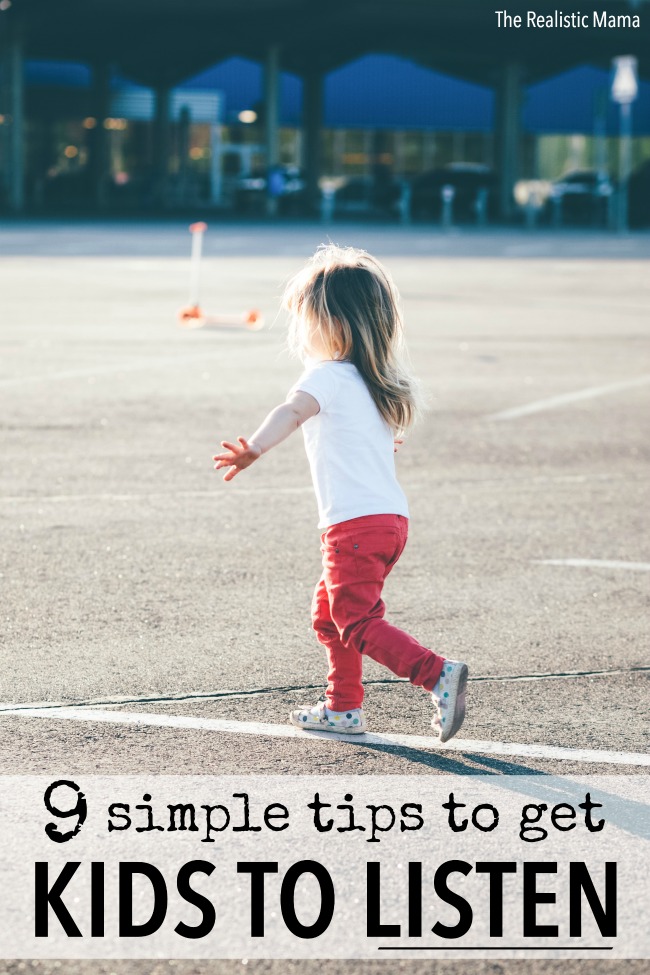Are you tired of asking your kids 1,000 times to do something? Feeling frustrated that even when they do seem to “hear” you, they forget to follow through?
Demanding, nagging and yelling will not get your kids to listen. In fact, if your child seems to listen “only when you yell,” chances are that they are obeying out of fear, rather than an internal drive to listen and follow directions.
If you want your kids to listen without yelling or nagging, you need to start with how you communicate your requests to them.
Instead of trying to force your child to listen, focus on yourself first. Change the way you make your requests, and then watch as your child changes their behavior.
Use these nine tips to get started:
1. Connect: Kids who feel a strong connection to their parents have a stronger desire to respond to their requests. If your child isn’t listening, focus on building the relationship first: play together, read, snuggle, laugh.
2. Limit your commands: Pay attention to how many corrections, requests or redirections you give your child during the day. Chances are, they have tuned you out! Focus on the big things so your child knows what’s important.
3. Whisper: If you have a loud voice or tend to yell your requests, change things up by using a softer tone. Your kids may be caught off guard and focus better. For young kids, whispering a request can be a fun game.
4. Eye contact: Instead of yelling a request from across the room, walk over and be present with your child. Make sure you have their attention before you give the request. Politely interrupt their activity, asking for eye contact, if necessary.
5. Repeat Back: Once you’ve given the request, ask your child to paraphrase what you just said. Even better, ask your child what is expected instead of telling them. For example, ask, “What else do you need to do before you get on the bus?”
6. Be respectful: Nothing shuts down communication like negativity, blaming and finger-pointing. Instead of, “This is the third time I’ve asked you to take out the trash; you’re so lazy!” try, “The trash needs to be out by 5 pm, please. Thanks for your help!”
7. Make it short: Encourage compliance by making your requests simple. “Shoes!” or “Plates in the sink, please.” Most children have difficulty processing a long list of requests. Focus on one or two at a time.
8. Give warnings: No one likes to be interrupted or surprised by a request. Give your child time to obey by giving advanced notice, when possible. Use a timer or something concrete (“at the next commercial”) for small kids.
9. Solve the bigger problem: There may be an underlying reason that your child is not listening. Observe your child and notice when they seem to struggle and when they follow through well. Common underlying problems and some suggestions are:
-
- Process information slowly — speak slowly with long breaks for thinking.
- Struggle with transitions — give warnings and allow for time between activities.
- Difficulty processing too many things at once — give one command at a time.
- Visual learner rather than auditory — use charts, lists, timers and pictures.
- Unsure what you expect — explain or demonstrate the behavior you’d like to see.
- Unable to complete the task — teach the skill and practice in advance.
Your child can learn to listen! But, it starts with you. Observe yourself over the next few days. What patterns and habits have you fallen into related to how you talk with your kids? This week, find one thing you’d like to change and pick something from this list to try instead.
(Note: Many parents tell me that they wonder about their child’s hearing. If you’re concerned, please talk to your doctor. In the meantime, try this test: while your child is in the room, whisper something about their most desirable activity and see if they respond, for example: “Who want’s to go get ice cream!” Most of the time, their hearing is suddenly just fine!)
Thanks for stopping by! Follow us on Facebook and Pinterest!
Visit Alida | The Realistic Mama’s profile on Pinterest.
 BY GUEST WRITER: Nicole Schwarz
BY GUEST WRITER: Nicole Schwarz
Nicole Schwarz is a mom to 3 young girls, a Parent Coach with a License in Marriage and Family Therapy, and author of Positive Parenting for Imperfect Families. Find positive parenting tips and learn more about Parent Coaching on her blog, Imperfect Families.
P.S. Are you looking for extra side income? I make full-time income blogging part-time—check out this easy step-by-step tutorial on how start a blog (no tech knowledge required).Download My Free Family Organizer

Ready to de-stress + spend more time with your kids?
Life gets busy. I hear you. I'm here to show you how to CREATE more time for what matters most. Get a free family organizer as a thank you for joining our newsletter – includes monthly calendars, chore charts, meal planners and more...






Thank you so much. This article was so helpful and I’m already starting
My goal for tomorrow. Just one VERY IMPORTANT THING. The test your children’s hearing by whispering will not give you indication if there’s a hearing problem. Reason why is bec they could very well hear a whisper when you’re close by and not hear a yell because deafness can cause one to hear background noise first if the person isn’t close by. In other words rhey hear a whisper but not you yelling their name across the hall.
Absolutely. The whisper test tells you nothing. Kids can have loss in one or both ears, partial or severe loss only in certain frequencies…
Always have your kid’s hearing checked by a doctor if you think there is even the remotest possibility of hearing loss as soon as possible.
Yes! Always have your child’s hearing tested by a doctor if you have any concerns. This is not a true test of a child’s hearing, more of a challenge for those kids who can hear well, but have “sudden” hearing loss for something like getting ready for bed or turning off the TV.
This is great advice! My son had real difficulty with transitions. I found warnings like, “we are leaving in 5 minutes” ineffective. I had better luck with more concrete warnings (often combined with choices): Would you like to do one more slide or two more slides before we leave? Another technique that helped was giving him a job/challenge. “Do you think you can carry these books to the car all by yourself?”
Great ideas!
I am definitely one of those that gets frustrated when my kids don’t listen. It seems like no matter what I do the never respond. I like your first tip about making sure that I have a strong connection with them first. I’ll be sure to make sure that’s established from now on.
These are all such good reminders. I enjoyed reading the article, but I have a question for the author. She listed several underlying problems, but I am wondering what she would suggest for the child that hears you and understands you, but straight up with every fiber in his body can not do what you ask simply because of control? My child is very capable and understands several commands at one time. The problem I am facing with him is the simple fact that he just has to be in control. Any thoughts on that kind of child?
That sounds frustrating! It’s difficult for me to give a detailed response without knowing more information. In general, if he is fighting for control, I would look for tons of ways for him to feel in control throughout the day. Depending on your son’s age, things like picking out clothes, choosing from a few breakfast, lunch or snack options, doing homework now or after 15 minutes of play, brushing teeth before or after putting on pjs, etc. I would also suggest decreasing the number of commands you give him throughout the day. Focus on the big, important things and leave the rest for now (or use visual charts, timers, or notes to keep him on track). Hopefully these 2 suggestions will decrease the resistance you’re getting.
Such a nice article, thank you for sharing this!